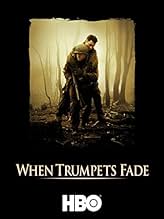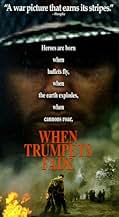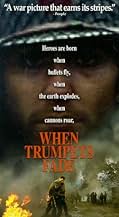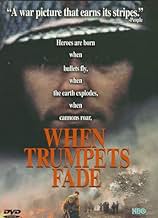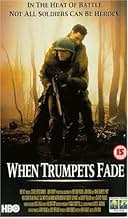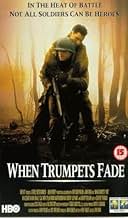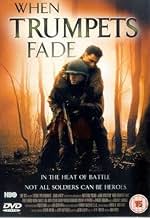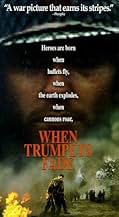The Sound of War - Wenn Helden sterben
Originaltitel: When Trumpets Fade
IMDb-BEWERTUNG
7,0/10
8911
IHRE BEWERTUNG
Füge eine Handlung in deiner Sprache hinzuA private in the latter days of WWII on the German front struggles between his will to survive and what his superiors perceive as a battlefield instinct.A private in the latter days of WWII on the German front struggles between his will to survive and what his superiors perceive as a battlefield instinct.A private in the latter days of WWII on the German front struggles between his will to survive and what his superiors perceive as a battlefield instinct.
- Auszeichnungen
- 1 Gewinn & 5 Nominierungen insgesamt
Frank-Michael Köbe
- German Sergeant
- (as Frank Köbe)
Matthew Rutson Cooney
- Driver Corporal
- (as Matthew Ruston Cooney)
Brian Hicks
- 1st Sergeant
- (as Gy. Sgt. Brian Hicks USMC)
John Miller
- Radio Man
- (as Cpl. John Miller USMC)
Peter Thomas
- News Footage Narrator
- (Synchronisation)
Empfohlene Bewertungen
Due to the fact that the two films came out close together, it is tempting to compare When Trumpets Fade to Saving Private Ryan. This would be a mistake. Unlike Private Ryan, Trumpets is not an epic set to a background of a crucial point in history, like D-Day, nor are the central characters members of an elite unit who are given a "heroic" assignment. Instead, the main character, Manning (Eldard), starts off as a private reluctant to risk his life, but who finds himself promoted and burdened with increasing responsibilities he does not want as his unit suffers horrendous attrition attempting to fight its way into Germany in late 1944. Manning's dilemma both contrasts and parallels that of his company commander, Captain Pritchett (Donovan), who has to balance achieving the objectives he has been assigned and keeping as many of his men alive as he can, and succeeding at neither. The greatest contrast with Private Ryan, however, comes in the form of the replacement troops, all green recruits with no combat experience - a far cry from Captain Miller's seasoned Rangers. Rounding it off is Dwight Yoakam as the nameless battalion commander who is unapologetic about driving his men to the slaughter, but whose face betrays the fact that, as with Captain Pritchett, their deaths weigh heavily upon him. When Trumpets Fade successfully showcases combat at its most gruesome and frustrating as Captain Pritchett's company batters itself to pieces against its target with nothing to show for the effort and bravery of the men except an ever-increasing pile of American corpses. But we get two good looks at the face of a German squad leader, portrayed by Frank-Michael Köbe, and in it we can see the despondency of a man who knows that he is fighting only to postpone the inevitable defeat of his country. A gritty, realistic, and depressing, but nonetheless excellent film.
Surprised to find criticism here. This is a film for grown ups. Its about infantrymen, you know, the bulk of the troops in contact with the enemy. Watching other films you might be tempted to think that only Paratroopers and Rangers did any fighting, being made up of highly motivated men with a higher purpose on heroic missions. I note criticism that the cynical nonconformist type should not appear until Vietnam films. I would suggest that a very high proportion of those in combat in WWII also didn't want to be there - my father landed on Sword beach on D-Day and certainly would rather have been somewhere else. We can still respect their sacrifice even though they only wanted to survive, because we are grown up. We don't need a film packed full of sentimentality, directors manipulation and musical cues telling us what emotions to feel... and as to complaining about the plot, how do you defend the absolutely contrived plot of that other film I haven't named (but you can guess which one I mean). See this film. Rant over.
The film makers obviously intended a memorial to the soldiers who fought and died in the Hurtgen Forest. Though this was not a docudrama, the story had to be true to the context, and for what I could tell, it definitely achieved that goal. The Battle was not a victory for the U.S. forces. The Germans pushed back the Allies during this battle, creating the "bulge" in the front lines. The Battle of the Bulge was a later victory, and it is duly remembered. But the Hurtgen Forest campaign, which was a defeat and by many commentators is viewed as a huge strategic blunder paid for in American blood, has largely been forgotten.
Why does everyone (including viewers) assume that Manning is a coward? Because he is the only survivor of his platoon? Perhaps that assumption accurately reflects the command mindset which caused so many deaths: death is so cheap that one more death is expected, in order to prove valor. (That is not a new concept, "The Red Badge of Courage" had it in a Civil War context; but it also seems to be a motivation for contemporary suicide bombers.) Contrast that with these soldiers' motives for the last mission--when the objective was clear: to save their own lives, rather than to make a noble but unavailing gesture.
Usually war films have more plot. But the Hurtgen Forest campaign was not as carefully plotted as a screenplay. Did any mission in this film seem to have any real point? The battle is accurately reflected here. This is not a compelling film, and it does not attempt to impart any great moral lessons, but it's best virtue is that it is honest.
My late father was in the "Bloody Bucket" (the 28th Infantry, Pennsylvania National Guard--note the red keystone insignia) during this battle, and he was fortunate to have survived. Decades later, he often would say to me that the trees could kill you. I was never really sure what he meant. This film showed me what he meant: the tree tops which were blown off by artillery fire would fall on the soldiers below.
Why does everyone (including viewers) assume that Manning is a coward? Because he is the only survivor of his platoon? Perhaps that assumption accurately reflects the command mindset which caused so many deaths: death is so cheap that one more death is expected, in order to prove valor. (That is not a new concept, "The Red Badge of Courage" had it in a Civil War context; but it also seems to be a motivation for contemporary suicide bombers.) Contrast that with these soldiers' motives for the last mission--when the objective was clear: to save their own lives, rather than to make a noble but unavailing gesture.
Usually war films have more plot. But the Hurtgen Forest campaign was not as carefully plotted as a screenplay. Did any mission in this film seem to have any real point? The battle is accurately reflected here. This is not a compelling film, and it does not attempt to impart any great moral lessons, but it's best virtue is that it is honest.
My late father was in the "Bloody Bucket" (the 28th Infantry, Pennsylvania National Guard--note the red keystone insignia) during this battle, and he was fortunate to have survived. Decades later, he often would say to me that the trees could kill you. I was never really sure what he meant. This film showed me what he meant: the tree tops which were blown off by artillery fire would fall on the soldiers below.
WHEN TRUMPETS FADE is one of the very best recent WWII films. It doesn't have anywhere near the scope of something like SAVING PRIVATE RYAN, but it captures what it was like to fight as a typical "grunt" in Europe during the winter of '44-'45--and what it's like to fight in a war anywhere--about as well as any movie can. Appropriately enough, its setting is the bloody, intense Battle of Hürtgen Forest, the longest single engagement in the history of the United States Army and one that, ironically, many of the history books largely ignore. Many experts now believe that this battle should have been avoided altogether.
Ron Eldard gives a really fine performance as "Manning," a reluctant draftee-type who's "not about to take a bullet for anyone." One of the best aspects of this film is the way it shows the psychology--and irony--of how Manning's higher-ups use him via a combination of threats, flattery, and promotions just to take one small strategic spot during the battle. Just about everyone else in the film--American or German, I don't believe that there are any non-military characters --gives a commendably believable performance, but special mention goes to Zak Orth, who plays a typical replacement who, young, green, and unsoldierly though he may seem, turns out to be a fine soldier, and Martin Donovan as Captain Pritchett, a typically ruthless, uncaring commander to the men in his company but a bit of a Private Manning himself to his superior officers.
Like most of today's war films, WHEN TRUMPETS FADE is gory, disturbing, and, by necessity (since it's about an unpopular and rather ineffectual battle), somewhat depressing. Still, the dialogue, battle footage, and various other aspects are nothing if not realistic. WHEN TRUMPETS FADE captures the cynicism of war-in-general incredibly well.
Ron Eldard gives a really fine performance as "Manning," a reluctant draftee-type who's "not about to take a bullet for anyone." One of the best aspects of this film is the way it shows the psychology--and irony--of how Manning's higher-ups use him via a combination of threats, flattery, and promotions just to take one small strategic spot during the battle. Just about everyone else in the film--American or German, I don't believe that there are any non-military characters --gives a commendably believable performance, but special mention goes to Zak Orth, who plays a typical replacement who, young, green, and unsoldierly though he may seem, turns out to be a fine soldier, and Martin Donovan as Captain Pritchett, a typically ruthless, uncaring commander to the men in his company but a bit of a Private Manning himself to his superior officers.
Like most of today's war films, WHEN TRUMPETS FADE is gory, disturbing, and, by necessity (since it's about an unpopular and rather ineffectual battle), somewhat depressing. Still, the dialogue, battle footage, and various other aspects are nothing if not realistic. WHEN TRUMPETS FADE captures the cynicism of war-in-general incredibly well.
In 1944, in Hurtgen Forest in the border of Belgium, Pvt. David Manning (Ron Eldard) is the only man of his company to survive a battle in the woods. He joins a new company trying to get a medical waive, and although having difficulties to respect his superiors, he is promoted to sergeant due to his leadership and instinct of survival. After a new battle, when he destroys the German cannons, he is promoted to lieutenant.
"When Trumpets Fade" is a great surprise: totally unknown in Brazil, without any publicity, it is indeed an excellent war movie. Based on a true story, the Hurtgen Forest Battle, where 24,000 soldiers died, this film shows, without any clemency or romance, how stupid a war is. The soldiers are moved by the instinct of survival, and not by patriotism like other movies usually present. The battle scenes are amazingly real, showing shattered bodies or man losing parts of their bodies. A must-see movie, recommended for audiences who look for raw and naked true story, with magnificent interpretations and direction. My vote is nine.
Title (Brazil): "Quando os Bravos se Calam" ("When the Braves Silence")
"When Trumpets Fade" is a great surprise: totally unknown in Brazil, without any publicity, it is indeed an excellent war movie. Based on a true story, the Hurtgen Forest Battle, where 24,000 soldiers died, this film shows, without any clemency or romance, how stupid a war is. The soldiers are moved by the instinct of survival, and not by patriotism like other movies usually present. The battle scenes are amazingly real, showing shattered bodies or man losing parts of their bodies. A must-see movie, recommended for audiences who look for raw and naked true story, with magnificent interpretations and direction. My vote is nine.
Title (Brazil): "Quando os Bravos se Calam" ("When the Braves Silence")
Wusstest du schon
- WissenswertesThe red keystone unit patch signifies that Manning and the others are part of the The 28th Infantry Division. The 28th is a unit of the Army National Guard and is the oldest division-sized unit in the US armed forces.
- PatzerThe Dragons teeth of the Siegfried line are not shown as they really were (and in numerous places still are today). 1) In the movie the line is built with four rows of teeth. In reality the line is built with five rows. 2) The teeth are in reality not made in one size as shown in the movie, but in 3 different sizes, where the first and last rows contain the biggest pillars, the middle three are middle sized, and woven in the last row you can find the smallest. 3) The rows are not placed exactly behind each other. If you would see them from above, you would see an angle in the middle. 4) The rows of pillars are also not built in one line. If you would look over a row from the side, you would see a zigzag of pillars. 5) The pillars in the movie are too close to each other. In reality, the area between two pillars is so big, you can park a car between them (as is done by the author of this comment on numerous occasions).
- Zitate
Pvt. David Manning: If I can help you in any way without endangering my own life, I won't hesitate. But I'm not taking a bullet for anybody!
Lt. Lukas: That's not good enough.
Pvt. David Manning: That's as good as it gets.
- VerbindungenReferenced in Ban the Sadist Videos! (2005)
Top-Auswahl
Melde dich zum Bewerten an und greife auf die Watchlist für personalisierte Empfehlungen zu.
Details
- Laufzeit1 Stunde 35 Minuten
- Farbe
- Sound-Mix
- Seitenverhältnis
- 1.33 : 1
Zu dieser Seite beitragen
Bearbeitung vorschlagen oder fehlenden Inhalt hinzufügen


